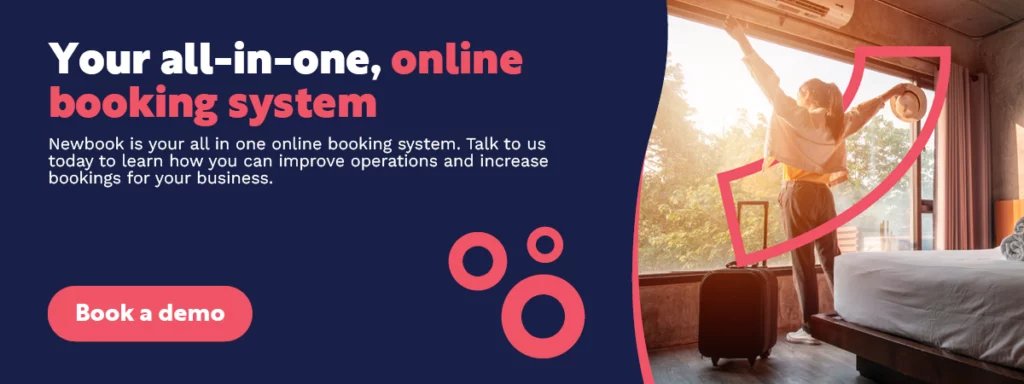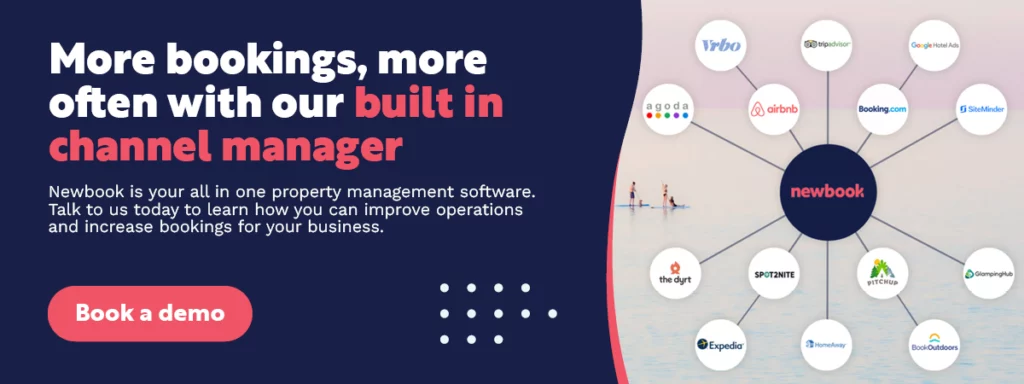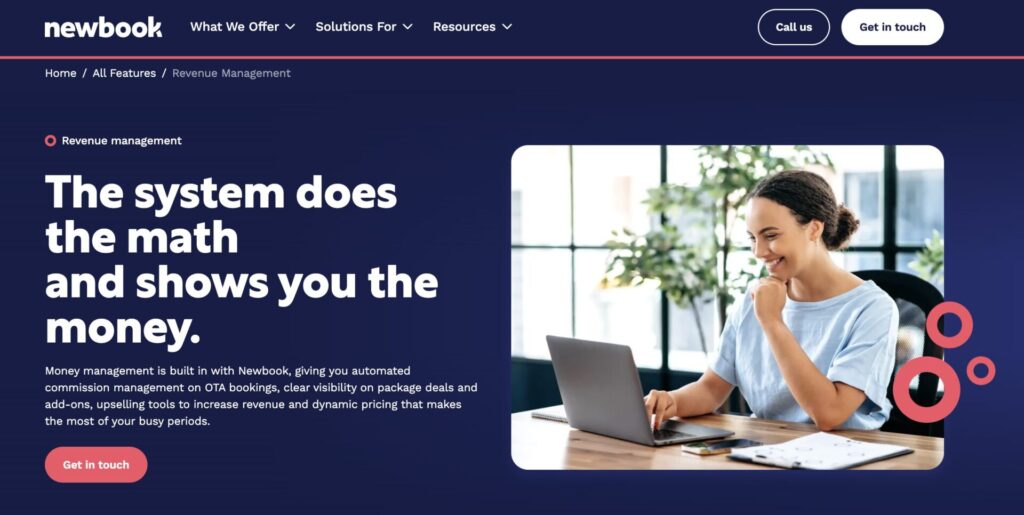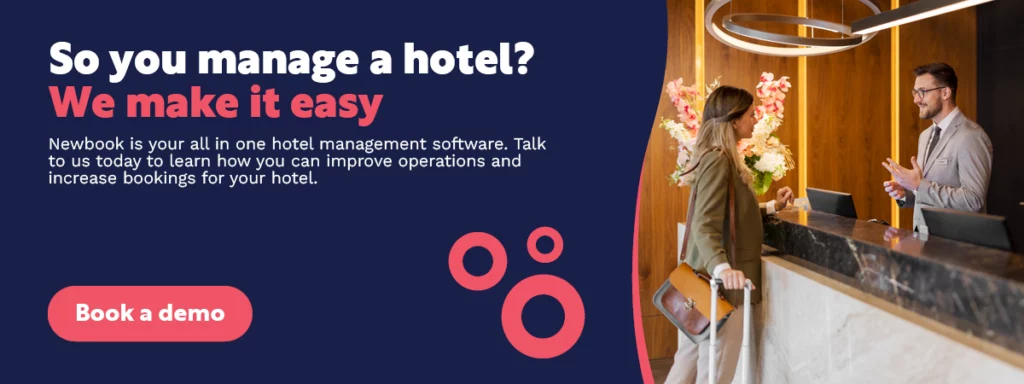Owning an accommodations business isn’t easy. There are natural ebbs and flows in the market, meaning that one month you could be making a ton of revenue, and the next month significantly less. During those periods of downturn, you’re probably wondering if there is a way to reduce the impact of the famine: what if there was a way to maximize the revenue potential of your rooms, campsites, units, or whatever other accommodations you provide, so that you can ensure that you have the ebay chance of landing bookings, even during slow seasons?
That’s where revenue management comes in. Often shortened to RMS, a revenue management system for hotels (or campgrounds, RV parks, Airbnb’s you name it) is an effective piece of software that’s an essential addition to your property management system (PMS). It allows you to view and control every aspect of how your property generates revenue in one easy-to-use system.

Plus, RMS property management can give you the insights you need to find creative ways to boost your business. For example, if your low season is winter, maybe there are local businesses that you can partner with that offer winter activities like skiing, snowboarding, or winter festivals that you can use to entice guests to visit during that time of year. Or, maybe your pricing is off during your low season, in which case dynamic pricing software—a feature that’s built into Newbook’s revenue management system—can help you set the right price at the right time.
No matter what your goals are for your accommodations business, having effective RMS property management in place is essential. In this article, we uncover what a revenue management system is, typical features and benefits of the software, and highlight some integrations that will help you boost your system’s functionality even further.

What Is a Revenue Management System?
A revenue management system (RMS) is a strategic tool used by businesses to optimize pricing and maximize revenue by keeping track of pricing. One of the most important components of an RMS property management system is dynamic pricing. This tool adjusts prices based on various factors such as demand, market conditions, and customer behavior.
Imagine you have a smart thermostat installed in your home. This thermostat constantly monitors factors like the temperature outside, the time of day, and your heating or cooling preferences. Based on this information, it automatically adjusts the temperature inside your home to ensure maximum comfort while minimizing energy consumption and cost.
Similarly, a revenue management system with dynamic pricing continuously analyzes data such as:
- Patterns and trends with regard to customer demand
- Competitor pricing
- Customer booking patterns
Using this information, it dynamically adjusts prices for products or services to maximize revenue while ensuring that prices remain competitive in the market. Just like the smart thermostat optimizes temperature control for your home, the revenue management system for hotels optimizes pricing strategies for accommodation businesses, helping them achieve their financial goals efficiently.
RMS Property Management 101 [Features & Benefits]

When it comes to managing the money for your accommodation business, it’s important to understand the essential functions and benefits that an RMS property management system can provide.
The table below summarizes the different features and benefits that you can expect in RMS hospitality solutions, and the sections below provide further details.
| Feature | Benefit |
|---|---|
| Effective OTA Commission management | – Allows you to determine which OTAs are the most lucrative to list with and which are eating into your budget- Lists all OTAs in one view- Syncs with your channel manager (Newbook) |
| More effective upselling | – Allows you to incorporate the appropriate upsell opportunities during the booking process- Gives the guest more comprehensive control over their vacation experience- Makes upsells appear less “salesy” |
| Dynamic pricing | – Allows you to automate pricing control based on market conditions, weather, seasonality, competitor pricing, and more- Syncs with your channel manager for real-time updates to all your OTAs (Newbook)- Allows you to set a minimum and maximum price for your properties (Newbook) |
| Price optimization rules | – Allows you to set rules and contents for your properties based on different factors- Gives you more control over your pricing- You can choose what to automate and what remains manual |
| Reporting and analytics | – Provides actionable insights that you can use to improve revenue, processes, or procedures- Breaks down different important metrics (which are also customizable) so you can see performance at a glance- Helps you make more educated and data-driven business decisions |
1. Commissions Management from OTAs
It’s normal for accommodation providers to list with a ton of online travel agencies (OTAs), as they are often what attracts new bookings. In fact, the vast majority of young people—Millennials and Generation Z—prefer to use online applications to book travel and accommodations, because they find it easier and more stress-free to do everything all at once. But there are a ton of different options on the market, including Expedia, Airbnb, Hotels.com, Booking.com, and much more, meaning that accommodation providers should probably list with all of them to attract the most customers.
The catch is that these vendors take a commission from successful bookings. The commission that they take can be anywhere from 20–30%, depending on the provider. Some may be a bit more, while others may be a bit less, depending on the platform’s popularity and the agreement you have with them (some larger accommodation providers with many properties may be able to strike a deal with some of these online travel platforms). If you list with many different OTAs, you might find that the costs involved in listing with some of them may not be worth your time based on the number of bookings you’re getting. This is normal, and it’s all part of determining where your revenue is coming from and where your budget is going.
A property management revenue system can assist you in keeping track of commissions being paid out to OTAs by keeping all of this information in one place for easy reference. From there, you can see which OTAs to cut from your listings, and which ones to keep.

2. Upselling Tools
Another way that a built-in property revenue management tool helps is by allowing you to keep track of upsells made through your direct booking process. With Newbook’s online booking system, you can easily incorporate the appropriate upsells during the booking process.
For example, if you run a campground and offer equipment rentals, you can put in an option for guests to add a kayak, bicycle, canoe, or other type of outdoor rental to their booking. This not only gives the guest more control over their vacation experience but also allows you to present upsells in a way that isn’t intrusive and makes sense for the guest to add. Guests will love being able to pay for everything in one go and be able to enjoy their vacation without having to shell out extra cash afterward for different activities they want to do.
3. Dynamic Pricing
Dynamic pricing, also known as surge pricing, demand pricing, or time-based pricing, is a pricing strategy in which businesses adjust the prices of their products or services in real-time based on various factors such as demand, supply, market conditions, and customer behavior.
In dynamic pricing, prices are not fixed but instead fluctuate according to changes in the market. For example, during periods of high demand or peak hours, prices may increase to capitalize on increased demand and maximize revenue. Conversely, during periods of low demand or off-peak hours, prices may decrease to attract more customers and stimulate demand.
It’s a popular pricing strategy in the hospitality industry because of the ebbs and flows of the market. These days, dynamic pricing is often built into RMS property management systems and is able to automatically sync your price adjustments across all your OTA channels as well as direct bookings without you having to lift a finger.
4. Demand Forecasting
Similar to dynamic pricing, demand forecasting utilizes historical booking data, market trends, and predictive analytics to forecast future demand for hotel rooms. This helps hoteliers anticipate fluctuations in demand and adjust pricing strategies accordingly to optimize revenue.
5. Price Optimization Rules
Related to dynamic pricing, price optimization allows accommodation providers to set rules and constraints for pricing adjustments, such as minimum and maximum rates, length-of-stay restrictions, and blackout dates. This gives providers greater control over pricing strategies, allowing them to tailor pricing rules to their specific business needs and objectives.
6. Reporting and Analytics
Generates reports and dashboards with key performance indicators (KPIs) such as revenue per available room (RevPAR), average daily rate (ADR), and occupancy rate, allowing accommodation operators to track performance and make data-driven decisions. These reports provide accommodation operators with actionable insights into revenue performance, allowing them to identify areas for improvement and optimize pricing strategies accordingly.
7. Forecast Accuracy
Evaluates the accuracy of demand forecasts and pricing strategies over time, allowing hotels to refine their revenue management practices for better results. This helps accommodation providers improve the accuracy of demand forecasts and pricing strategies, leading to more effective revenue management and increased revenue potential.
8. Inventory and Yield Management
Effective inventory management Monitors room availability and allocates inventory to different distribution channels to optimize revenue and occupancy. The benefit is that it maximizes revenue by effectively managing room inventory and availability across various booking channels.
Yield management, on the other hand, applies pricing strategies to different room types, rate categories, and booking channels to maximize revenue from each segment. This allows hoteliers to optimize pricing for different market segments and maximize revenue potential.
How to Assess Property Management Revenue

Assessing property management revenue in hospitality involves analyzing various factors to evaluate the financial performance and revenue-generating capabilities of a hotel or other hospitality property. Here are some steps to assess property management revenue effectively:
- Revenue sources: Identify all revenue streams generated by the property, including room revenue, food and beverage sales, event bookings, ancillary services (such as spa treatments or parking fees), and any other sources of income.
- Revenue analysis: Analyze revenue data over a specific period (e.g., monthly, quarterly, annually) to identify trends and patterns in revenue generation. Compare revenue figures to previous periods and industry benchmarks to assess performance.
- Room revenue: Evaluate room revenue by analyzing metrics such as average daily rate (ADR), occupancy rate, revenue per available room (RevPAR), and total room revenue. Assess performance against historical data and market trends.
- Food and beverage revenue: Assess food and beverage revenue by analyzing sales data from restaurants, bars, room service, and catering events. Evaluate factors such as menu pricing, customer satisfaction, and cost of goods sold (COGS).
- Ancillary revenue: Evaluate revenue from ancillary services such as spa treatments, parking fees, Wi-Fi charges, and other amenities. Assess pricing strategies, utilization rates, and customer demand for these services.
- Distribution channels: Analyze revenue generated from different distribution channels, including direct bookings, online travel agencies (OTAs), global distribution systems (GDS), and corporate contracts. Evaluate commission rates, distribution costs, and channel performance.
- Revenue management strategies: Assess the effectiveness of revenue management strategies, including dynamic pricing, yield management, and promotional campaigns. Evaluate their impact on revenue generation and profitability.
- Market analysis: Conduct a competitive analysis to compare the property’s revenue performance against competitors in the market. Evaluate factors such as pricing strategies, market positioning, and customer preferences.
- Customer feedback: Consider customer feedback and reviews to assess the overall guest experience and its impact on revenue generation. Identify areas for improvement to enhance guest satisfaction and loyalty.
- Financial performance metrics: Evaluate financial performance metrics such as gross revenue, net revenue, profit margins, and return on investment (ROI). Assess profitability and identify opportunities for cost optimization and revenue growth.
- Future projections: Develop revenue forecasts and projections based on historical data, market trends, and anticipated changes in demand. Identify opportunities for revenue optimization and strategic initiatives to drive future growth.
Revenue Management System for Hotels Case Study: Newbook

Being a revenue manager involves juggling numerous factors, including staying updated on local events, travel conditions, weather patterns, economic trends, and internal data regarding guest behavior and industry trends. In other words, revenue managers need to be able to blend their analytical skills with their hospitality expertise to determine the appropriate level of automation needed for pricing strategies tailored to your accommodation business.
Given the vast amount of data to manage, it’s only logical for revenue managers to rely on a system that can aggregate and interpret this information effectively. Not every revenue manager has highly technical data analysis skills, either, so the system must be easy to use in addition to providing effective and actionable insights.
Combining an RMS with a PMS is crucial for centralizing data. Newbook offers a comprehensive solution that includes:
- Commission management
- Upselling tools
- Dynamic pricing functionality
- Robust property management features
Ensuring that both quantitative and qualitative data are consolidated in one platform. Dynamic pricing further streamlines the process by allowing the system to autonomously generate optimal prices using market intelligence data, reducing the need for constant manual monitoring.
So what else makes Newbook stand out as an optimal RMS property management solution?
Our integrated solution simplifies accommodation management by providing a wide range of essential services all within one user-friendly platform. From a robust booking engine to self-service options for guests and built-in channel management for OTAs, Newbook offers everything you need in a single package.
We understand the importance of seamless integration with various platforms, which is why we support hundreds of integrations with popular tools through our integrations store.
Security and continuity are our top priorities. With a robust 99.99% uptime guarantee and advanced cybersecurity and data protection protocols, Newbook ensures uninterrupted revenue generation without the worry of downtime.
While many solutions offer a 99% uptime, our extra .99% makes a significant difference:
- 99% uptime guarantee could result in over three days of potential downtime annually
- 99.99% uptime guarantee equates to just over 52 minutes of potential downtime
Beyond technology, we are committed to providing personalized customer service. From initial onboarding to ongoing support, we offer a white-glove service experience. At Newbook, we strive to form genuine partnerships with our customers, serving not only as a technology provider but also as a trusted ally in their day-to-day operations. Choose Newbook as your property management solution for unparalleled efficiency, security, and support in your accommodation business.

RMS Property Management System Integrations for an Extra Boost
Newbook offers the utmost in flexibility in your revenue management functionality through a wide range of integrations, allowing you to completely customize your RMS property management system to suit your specific needs.
All integrations can be viewed on our integrations store, including hundreds of options for categories not included in the table below.
| Category | Integration |
|---|---|
| Online payments and POS | – Newbook Payments: Incorporates EFTPOS terminals, gateways, BPAY, and a range of other payment methods.- Clover: Provides intelligent, tailored POS devices enabling payment tracking and facilitating guest charge processing.- Bepoz: Delivers a wide range of comprehensive retail POS solutions. |
| Business Intelligence | – Calumo: Provides intelligent dashboards, reporting features, and forecasting tools to empower decision-making.- Qlik: Utilizes in-memory processing and on-demand aggregations, enabling the discovery of profound insights from data.- Tiger TMS: Offers specialized middleware tailored for smart devices, facilitating the extraction of intelligence from usage patterns. |
| Accounting | – Attache: A flexible accounting system designed for medium-sized businesses- Infobiz: An online trust accounting system that seamlessly integrates with Newbook and offers features like regulatory compliance, owner logins, and local support.- Orbix solutions: Connect other software like AttacheMYOB, or Reckon to Newbook for the ability to manage financial data in real time.- Quickbooks: When integrated with Newbook, you can send transactions to Quickbooks automatically each day, making reconciliation of your accounts faster and easier.- Reckon: Robust software that helps you manage finances, payroll, and inventory. |
Conclusion
Accommodations management demands a proactive approach to revenue generation, especially during fluctuating market conditions. A revenue management system (RMS) emerges as a crucial tool for optimizing pricing strategies and maximizing revenue potential. By seamlessly integrating with property management systems (PMS), RMS empowers accommodation providers to efficiently manage every aspect of revenue generation from a centralized platform.
The benefits of RMS are multifaceted, offering insights that drive creative business solutions and enhance overall performance. Whether it’s optimizing pricing through dynamic pricing tools, managing OTA commissions effectively, utilizing upselling opportunities, or leveraging data-driven analytics, RMS equips accommodation businesses with the tools needed to thrive in competitive markets.
Newbook stands out among RMS solutions, offering a comprehensive suite of features designed to streamline operations and enhance revenue generation. With a commitment to uptime reliability, robust security measures, and personalized customer service, Newbook emerges as a trusted partner in navigating the complexities of accommodations management.
Newbook’s extensive integration capabilities provide additional flexibility, allowing businesses to tailor their RMS solutions to meet specific needs. Whether it’s online payments and POS integration, business intelligence tools, or accounting software integration, Newbook offers a seamless ecosystem of solutions to optimize revenue management processes.
In essence, RMS represents a transformative solution for accommodation providers seeking to adapt to evolving market dynamics and maximize revenue potential. By harnessing the power of data-driven insights and innovative technology, businesses can achieve unparalleled efficiency, security, and support in their revenue management endeavors. Choose Newbook as your trusted partner and unlock new possibilities for success in the accommodations industry.
Get in touch with us today to schedule a demo or get answers to any questions that you may have about our software.

